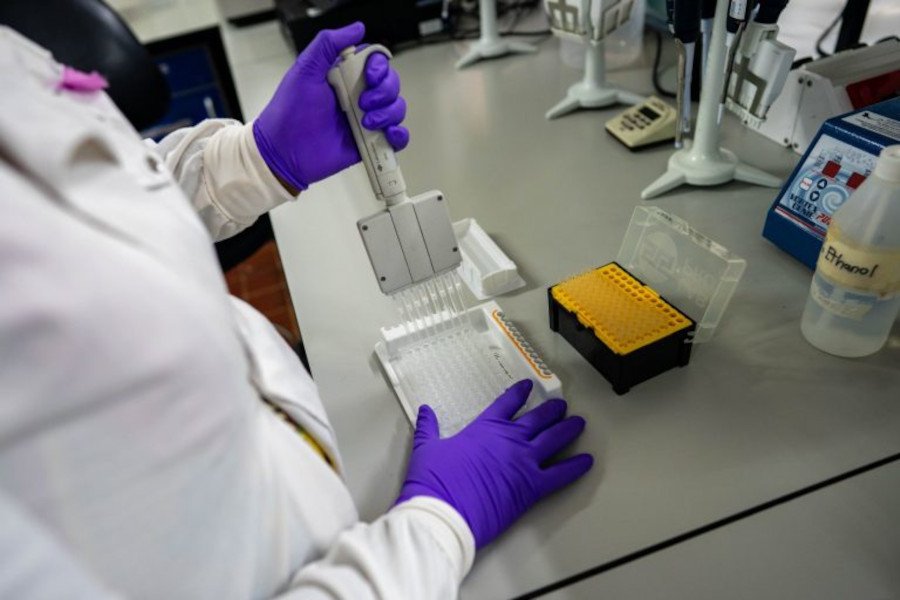
Credit: LSHTM/Louis Leeson
Using whole genome sequencing and epidemiological data through population-based surveillance, researchers at the Medical Research Council Unit The Gambia at LSHTM have found an increase in the proportion of Salmonella disease caused by atypical serovars over time. The results of the study, published in the Microbial Genomics journal, showed acquisition of specific genetic virulence factors in the atypical serovars which could be the driver to the change observed.
Invasive non-typhoidal Salmonella (iNTS) disease continues to be a significant public health problem in sub-Saharan Africa. Non-typhoidal Salmonella are enteric pathogens known to cause gastrointestinal diseases in humans and animals. However, they have also been known to cause invasive diseases such as septicaemia, pneumonia, and meningitis especially in sub-Saharan Africa. High death rate, clinical misdiagnosis, antimicrobial resistance, and lack of a vaccine make invasive non-typhoidal salmonella (iNTS) a priority for global health research.
The researchers conducted population-based surveillance for invasive bacterial disease in individuals aged 2 months and older residents in the Basse Health and Demographic Surveillance System (BHDSS) in the Upper River Region of The Gambia. Standardised criteria were used to identify and investigate patients presenting with suspected pneumonia, septicaemia, or meningitis to all health facilities in the study area between May 2008 and December 2016. The team analysed 164 Salmonella genomes from isolates obtained from blood, CSF or LA samples collected during the surveillance. Genomic DNA was extracted in-house from all isolates and sent to the Wellcome Sanger Institute, UK, for whole genome sequencing.
The study has shown a wide distribution of invasive salmonella serovars circulating in The Gambia. More importantly, it revealed an increase in atypical serovars with high case fatality rates over time.
Abdoulie Kanteh, Higher Scientific Officer at the MRCG at LSHTM and first author of this paper said, “Types of Salmonella which are normally associated with mild illness such as food poisoning, were found to be causing sepsis, meningitis and pneumonia, sometimes leading to death. This was only discovered by the combination of a decade-long study and genome sequencing, which helped to identify these unexpected patterns of disease. The underlying driver appeared to be unique genetic changes which make these Salmonella more virulent. Antibiotic resistance is a public health problem, and our study has shown some types of Salmonella (i.e. Enteritidis) to be resistant to many antibiotics.”
Dr Grant Mackenzie, Paediatrician and Clinical Epidemiologist, is senior author of the publication. He commented, “Our combination of population-based representative surveillance over 9 years for severe non-typhoidal Salmonella disease and insightful genomic analyses has illuminated this pathogen’s potential for varied virulence and evasion of some of the proposed vaccines in development.”
The researchers note that experimental and functional studies could shed more light on the role virulence genes and the evolutionary pressures on the serovars. The shift in serovar prevalence could have implications for vaccine development and thus, represent a public health concern. Therefore, there is a need to identify potential changes in the distribution of iNTS serovars elsewhere in Africa, and the prevalence of these virulence elements.
The surveillance study was funded by GAVI’s Pneumococcal vaccines Accelerated Development and Introduction Plan (PneumoADIP), the Bill and Melinda Gates Foundation, and the UK Medical Research Council.
If you enjoyed this article and would like to build a career in global health, we offer a range of MSc programmes covering health and data, infectious and tropical diseases, population health, and public health and policy.
Available on campus or online, including flexible study that works around your work and home life, be part of a global community at the UK's no.1 public health university.
